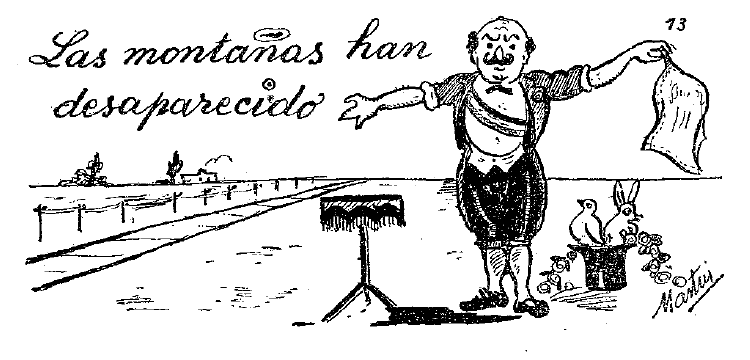
| Языки :: Испанский |
| Аудио |

 |
|
 |
|
|
Español |
Spanish |
| 39 | Lección Trece | |
| Leo el periódico | I read the paper. | |
| 1 |
Las montañas han desaparecido; el campo es monótono y aburrido (1). |
The mountains have disappeared; |
| 2 |
Tomo mi periódico, que se titula
« Ahora », |
(I) take my paper, which is entitled [ent. itself] "Now" and has more than 30 pages, with many pictures. |
| 3 |
Comprendo muchas palabras, pero el sentido de las frases se me escapa (2). |
(I) understand many words, but the meaning of the sentences escapes [it] me. |
| 4 | Vamos a ver los anuncios, acaso entenderé mejor (3). |
Let us [go to] see the advertisements; perhaps (I) shall understand better: |
| 5 |
« Representantes : se necesitan en todos los pueblos de todas las provincias de España. Buena comisión. » |
"Agents wanted [require themselves] in all the localities of all the provinces of Spain. Good commission. |
| 6 | Es muy fácil; no se necesita un diccionario para entenderlo (4). | (It) is very easy; no need for [does not require itself] a dictionary to understand it. |
| 7 |
Otro anuncio : « Pensión Madrileña; baño, agua corriente (5), teléfono; |
Another advertisement : "Madrilenian boarding-house; bath-room, running water, telephone; |
| 8 |
pensión completa desde nueve pesetas. General Pardiñas 11, tercero. » |
full board from 9 pesetas. General P., 11, 3rd. |
| EJERCICIOS | EXERCISE : | |
| 1 |
El corazón le tengo martirizado de ver que sin motivo me has olvidado. |
[My heart is tortured to see that without reason you have
forgotten me) |
| 2 |
Instead of an exercise, here Is to-day a popular "copla",
or "couplet", |
| NOTES. | |
| 1 | El campo, the field or the country. |
| 2 | "Escapes itself (from) me "; we shall often find this construction. |
| 3 |
Vamos a ver : "let us go to see " corresponds to :
let's see. |
| 4 | See less. 14, parag. 2. |
| 5 |
The adjective current, in the masculine, is
corriente; |
